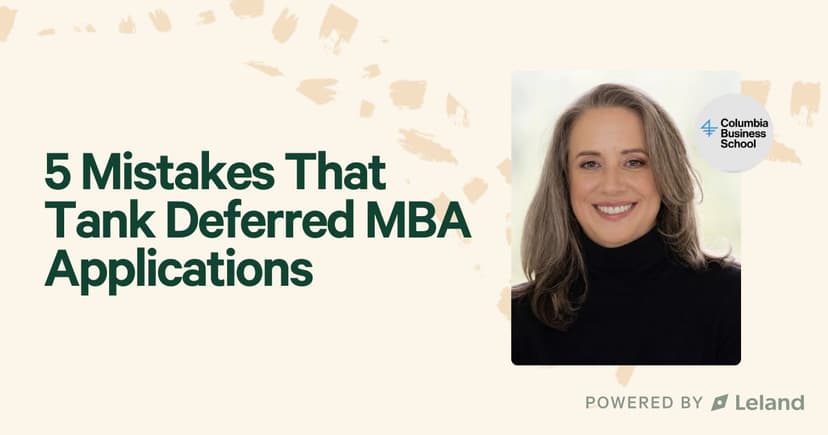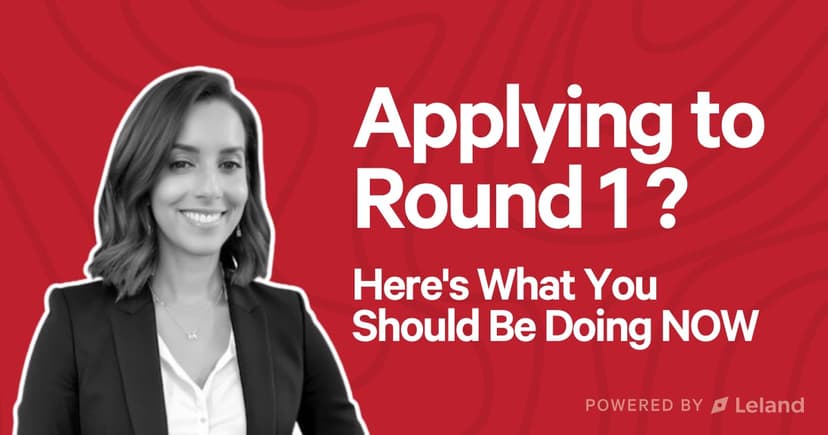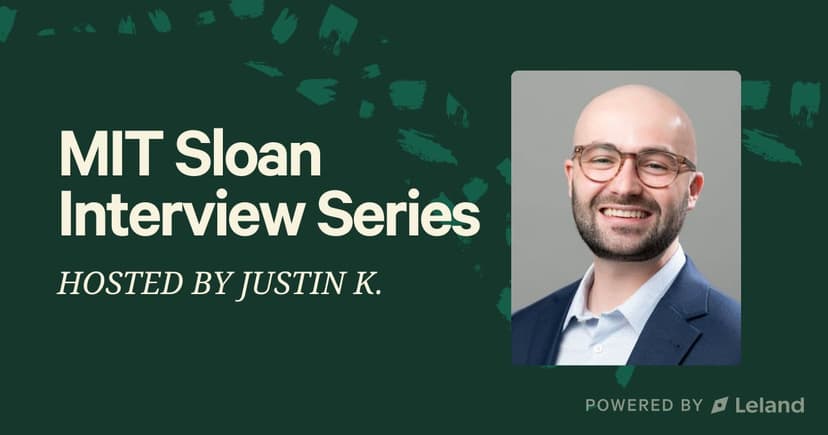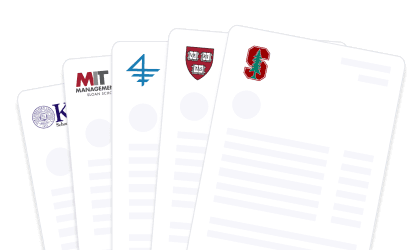The 25 MBA Programs That Don't Require GMAT (or GRE)
Explore top online MBA programs with no GMAT needed. Find the right fit, compare options, and start your MBA without taking the test.
Posted February 6, 2026

Join a free event
Learn from top coaches and industry experts in live, interactive sessions you can join for free.
Table of Contents
Looking for MBA programs that don’t require the GMAT or GRE? You're in the right place. Many schools now recognize that your work experience and academic history often reflect your potential better than a test score. This shift has created more opportunities for MBA students, particularly those seeking flexible online programs that accommodate their real-life schedules.
But which programs actually give you a fair shot without a test? How do you know if you qualify for a waiver or a truly test-free path? And what should you expect from schools that evaluate your experience instead of a number on a score report?
In this guide, we’ll break down 25 MBA programs that no longer require the GMAT or GRE and what that means for your application strategy.
Why Some MBA Programs No Longer Require GMAT or GRE Scores
Changes in Business School Admissions
Business schools have shifted away from requiring GMAT or GRE scores for several reasons. Admissions committees have broadened their evaluation criteria to consider an applicant’s real-world business experience, academic background, and leadership potential instead of just standardized test scores. Schools are prioritizing qualities that better reflect a candidate’s ability to navigate complex business challenges, contribute to the classroom, and succeed in their post-MBA career.
Reasons for this shift include:
- Stronger Focus on Holistic Admissions: Many MBA programs now use a holistic admissions process, meaning they evaluate applicants based on various factors, not just test scores. Schools assess an applicant’s undergraduate GPA, work experience, leadership skills, and communication abilities to determine their readiness for an MBA program.
- More Weight on Work Experience and Career Progression: Business schools recognize that years of professional experience, career progression, and on-the-job leadership development often predict success in an MBA program better than a standardized test. Executive MBA and flex MBA programs, in particular, value real-world business strategy experience over test performance.
- Emphasis on Academic Achievements and Undergraduate GPA: Instead of requiring a GMAT or GRE score, many MBA programs accept applicants based on their undergraduate GPA and previous academic performance. Those with a strong academic record and an advanced degree in a relevant field may be able to demonstrate their quantitative and analytical abilities without taking a test.
- Growing Popularity of Online MBA and Executive MBA Programs: Many online MBA and executive MBA programs cater to working professionals who may not have the time or need to take a standardized test. Schools have adjusted their admissions process accordingly, allowing applicants to demonstrate their readiness through work history, managerial experience, and business knowledge.
- Test Waivers for Qualified Applicants: Many business schools have adopted GMAT/GRE waiver policies for applicants who can prove their quantitative and analytical skills through coursework, an advanced degree, or significant work experience. Some schools also consider industry certifications, such as CFA, CPA, or PMP, as alternatives to standardized test scores.
Note: Some programs, particularly online MBA and executive MBA programs, emphasize professional experience over test scores. Many business schools have also introduced waiver policies for applicants with strong academic backgrounds or an advanced degree.
Who Benefits From No-GMAT MBA Programs
No GMAT programs give a real advantage to people who already show they can handle the work. If you have steady growth in your career or you lead projects and teams, you are already showing the kind of judgment and problem-solving schools want to see. Roles like engineering, finance, IT, or marketing fall into this group because their daily work proves they can think through complex tasks without a test score.
These paths are also ideal if you’ve been out of school for a while or earned another graduate degree. Your experience shows you can manage deadlines, lead teams, and tackle complex challenges.
What “No GMAT Required” Actually Means
When a school says you do not need the GMAT, it can mean a few different things.
- Test-free means the school will not look at GMAT scores at all.
- Test optional means you can send a score if you want, but you do not need to.
- Waiver means you can skip the test if your work or school record shows you are prepared.
Your goal is to know which type each school uses. Test free is the easiest. Waivers usually need proof that you are ready, like good grades or solid work experience. Test optional simply gives you a choice. Once you know the policy, you can focus on the programs that fit your situation.
Expert Tip: Ask yourself, 'How will this school assess my application without the test?' The more selective the program, the more you’ll need to compensate with a clear, well-crafted narrative.

The 25 MBA Programs That Don’t Require GMAT or GRE
Below you’ll find each tier with its included programs to help you compare different levels of selectivity and program expectations.
Tier 1 MBA Programs That Don’t Require GMAT or GRE
Tier 1 programs are the most selective. They look for strong grades and clear leadership even without a test. These schools often expect solid experience and a sharp academic record because they move fast and demand a lot from their students.
| School | Waiver Policy | Program Type |
|---|---|---|
| Massachusetts Institute of Technology – Sloan School of Management | GMAT/GRE waivers for applicants with strong professional and academic records. | Full-time MBA |
| Harvard Business School | Test waivers for select applicants with proven leadership skills. | Full-time MBA |
| University of Chicago – Booth School of Business | Waiver based on professional and academic achievements. | Full-time MBA, Executive MBA |
| Columbia Business School | Test waivers for strong applicants with significant business experience. | Full-time MBA, Executive MBA |
| Stanford Graduate School of Business | Waivers for candidates with an advanced degree or exceptional academic record. | Full-timr MBA |
Note: This means that tier 1 programs work well when you bring strong quantitative preparation, consistent academic performance, and leadership experience.
Tier 2 MBA Programs
These schools are highly ranked programs with strong career support and competitive admissions.
| School | Waiver Policy | Program Type |
|---|---|---|
| University of Michigan – Ross School of Business | Waivers for applicants demonstrating business strategy experience. | Full-time MBA |
| University of Virginia – Darden School of Business | GMAT/GRE waivers for applicants with academic achievements and leadership experience. | Full-time MBA |
| New York University – Stern School of Business | Test waivers available for strong candidates. | Full-time MBA |
| Yale School of Management | Waivers for applicants with a high undergraduate GPA. | Full-time MBA |
| University of California, Berkeley – Haas School of Business | Waivers for applicants with strong leadership development experience. | Full-time MBA |
| Duke University – Fuqua School of Business | Waivers for candidates with advanced degrees or business challenges experience. | Full-time MBA |
| Cornell University – Johnson Graduate School of Management | Test waivers for applicants with extensive career advancement experience. | Full-time MBA |
Note: If you have good grades or meaningful work experience, you can be competitive without a GMAT score.
Tier 3 MBA Programs
These schools welcome applicants with different backgrounds and levels of experience.
| School | Waiver Policy | Program Type |
|---|---|---|
| University of Rochester – Simon Business School | No GMAT/GRE is required. | Full-time MBA |
| University of North Carolina – Kenan-Flagler Business School | Waivers based on academic record. | Full-time MBA |
| University of Texas at Austin – McCombs School of Business | Waivers for applicants with career advancement experience. | Full-time MBA |
| Indiana University – Kelley School of Business | Waivers for applicants with advanced degrees. | Full-time MBA |
| University of Washington – Foster School of Business | Waivers are based on strong academic achievements. | Full-time MBA |
| University of Southern California – Marshall School of Business | No GMAT is required for executive MBA programs. | Executive MBA |
| University of Maryland – Smith School of Business (College Park) | Waivers for applicants with business world experience. Located in College Park, it offers a vibrant academic community and is top-ranked for its comprehensive career services. | Full-time MBA |
| University of California, Irvine – Paul Merage School of Business | Waivers are based on career advancement and academic rigor. | Full-time MBA |
| American University – Kogod School of Business | No test scores are required for online MBA applicants. | Online MBA |
| University of San Francisco – School of Management | No GMAT/GRE is required. | Full-time MBA |
| Syracuse University – Whitman School of Management | Waivers are available for most programs. | Full-time MBA |
| Babson College – F.W. Olin Graduate School of Business | Waivers based on leadership development experience. | Full-time MBA |
| University of Miami – Herbert Business School | No GMAT or GRE required for several top MBA programs. | Full-time MBA |
Expert Tip: Policies can change, so it's always a good idea to double-check the official website of each program for the latest info on GMAT/GRE requirements and waivers.
Online MBA Programs Without GMAT Requirements
Online MBA programs continue to expand their test-optional pathways. Below is the table showing more details.
Online MBA Programs No GMAT
| School | Policy | Format |
|---|---|---|
| Indiana University Kelley School | Test-optional online MBA pathway | Online MBA |
| UW Foster | Reviews academic and professional backgrounds | Online MBA |
| Rochester Institute of Technology | Accepts online MBA applicants without test scores | Online MBA |
| University of Maryland, College Park | Waives tests for qualified online applicants | Online MBA |
| American University Kogod | No GMAT or GRE required | Online MBa |
Note: These programs help you develop leadership skills, gain experience in business analytics, and study online.
Types of No-GMAT MBA Programs
MBA programs without GMAT or GRE requirements come in several formats. Each option supports different goals depending on your experience, schedule, and preferred learning style.
Full-Time MBA Programs
Full-time MBA programs work well if you want an in-person experience with structured schedules, faculty support, and access to a strong professional network. These programs often review your undergraduate degree, official transcripts, minimum GPA, and leadership roles instead of standardized test scores.
Executive MBA Programs
Executive MBA options are designed for experienced professionals. Schools focus on your professional experience, leadership roles, human skills, and career progression. These programs may accept applicants without a GMAT or GRE result because work history shows your readiness for advanced coursework.
Online MBA Programs
An online MBA program gives you flexible online enrollment and remote coursework. Many online programs use a test-optional model and accept applicants with solid academic backgrounds or experience in areas like project management, corporate finance, financial management, business analytics, or supply chain management.
How To Choose the Right No-GMAT MBA Program
Choosing a no-GMAT MBA program is about finding the right fit for your goals, background, and learning style. Here’s how to navigate the landscape strategically.
1. Align Program Requirements with Your Strengths
Every program evaluates applicants differently. Some may emphasize academic rigor, like GPA or coursework in quantitative fields, while others prioritize leadership roles or industry-specific experience.
Expert Tip: If your undergrad GPA isn’t stellar but you’ve managed teams or driven impact in your career, prioritize programs that emphasize holistic review or leadership-driven admissions (e.g., Babson, Syracuse, or USC Marshall).
2. Define Your Career Trajectory Early
What do you want out of an MBA? A career switch, promotion, or entrepreneurship? Select programs that specialize in your intended outcomes. For instance:
- Interested in business analytics? Look at schools like Indiana Kelley or Maryland Smith.
- Eyeing a nonprofit-to-corporate pivot? Babson and Kogod tend to value mission-aligned leadership.
- Planning a C-suite trajectory? You’ll want programs with strong executive tracks, like Chicago Booth or Berkeley Haas.
3. Know the Real Differences Between Test Policies
The terms sound similar but signal very different things:
- Test-Free: No GMAT/GRE considered at all. Ideal for candidates who want a clean break from standardized testing.
- Test-Optional: You can submit scores if they help, but you won’t be penalized if you don’t.
- Waiver-Eligible: You must apply to skip the test and justify readiness via transcripts, certifications, or work experience.
Expert Tip: Waivers are common, but it is not guaranteed. Have a backup plan if your waiver is denied.
4. Look Beyond the MBA Brand
Highly ranked programs are tempting, but they’re not always the most flexible or aligned with your needs. Compare based on:
- Class format (in-person vs. online)
- Networking ecosystem (regional, national, or industry-specific)
- Experiential learning opportunities
- Career services and recruiter access
5. Strategically Use Your Application Materials
When applying test-free, the weight shifts to your essays, résumé, and recommendations. Use them to tell a cohesive career story, show quant readiness through work projects or courses, and demonstrate leadership via clear metrics and outcomes
A well-positioned narrative beats a high test score in many of today’s programs. Be strategic, clear, and proactive.
Editor’s Pick: Best No-GMAT Programs by Applicant Type
Check out our Editor's Pick for the best No-GMAT programs, specially chosen based on different applicant types. This table highlights the top options to help you find the perfect fit for your background and goals.
| Applicant Type | Recommended Programs |
|---|---|
| Career switcher | USC Marshall, Babson Olin |
| Tech professional | UW Foster, Georgia Tech Scheller |
| Nonprofit leader | Syracuse Whitman, American Kogod |
| Aspiring consultant | Cornell Johnson, UVA Darden |
| Global business track | INSEAD (Executive MBA), Yale SOM |
Application Process for No-GMAT MBA Programs
Prepare Your Academic Materials
Most business schools review your academic readiness through official transcripts, your undergraduate degree or bachelor’s degree, and your minimum GPA. Some programs require evidence of strong performance in core courses tied to business administration, business analytics, or financial management.
Show Your Professional Experience
Many MBA programs accept applicants based on leadership roles or work experience instead of standardized test scores. Experience in project management, human resources, information technology, supply chain management, or data analysis can help you qualify for test-optional pathways. Your résumé should reflect clear career advancement.
Submit Written Materials and Recommendations
Your personal essays and letters of recommendation give admissions teams a view of your goals and leadership skills. Schools use these materials to understand your fit for the program and your potential for future success. This applies to full-time MBA programs, online MBA programs, and online MBAs.
Understand Waiver or Test-Optional Policies
Some programs require a waiver request. Others are fully test-optional and do not require a GMAT or GRE score at all. Review what each program requires so you know whether the program accepts applicants with professional experience as an alternative to standardized tests.
Financial Aid and Affordability
Tuition and Funding Options
Many MBA programs offer financial aid or federal student aid to help you manage tuition. This applies to on-campus formats, executive options, and online MBA programs. You can also look for employer support if your current role values business leadership or advanced training.
Comparing Costs Across Programs
Some accredited college programs offer lower tuition than others, and many schools provide affordable online MBA programs for working adults. When comparing options, review tuition rates, program length, and any required application fees.
Using Education Data for Planning
You can review information from the National Center for Education Statistics to compare schools. This helps you understand the business environment, online enrollment patterns, and completion rates across different online programs and colleges of business.
Career Paths for MBA Graduates From No-GMAT Programs
Management and Leadership Roles
MBA graduates often move into roles that require business leadership and decision-making. You may qualify for positions in human resources, project management, or business administration where leadership skills are central.
Finance and Analytics Careers
Many programs prepare you for work in corporate finance, financial management, business analytics, supply chain management, or data analytics. These fields look at your applied skills rather than whether you submitted a GMAT score or other standardized test.
Growing Opportunities Across Industries
You can use your MBA degree in large companies, smaller firms, or fast-growing sectors. Many employers value applicants who have completed accredited college programs, gained experiential learning opportunities, and built a strong professional network during the program.
The Bottom Line
Skipping the GMAT or GRE doesn't mean lowering your ambitions. It means applying smarter. Use this guide to target programs aligned with your experience and goals, and tell a story that proves you're more than just a number. If you're unsure where to begin, consider working with an MBA admissions coach to help position your strengths and navigate waiver policies with confidence.
Work with MBA Admissions Coaches
If you want support during the application process, working with an MBA Admissions Coach can help you match your background to the programs that fit you best. They can help you shape your story and match your experience with programs that see your potential even without a test score.
Related Articles
- 15+ Affordable Online MBA Programs in 2025
- MBA Admissions Coaching — 2024 Geography Report
- 3 Things You Need for Successful Stanford MBA Essays
- The 25 Best 1-Year MBA Programs for 2025
- Is an MBA Worth It? Pros, Cons, and How to Decide
- Top MBA Programs for a Career in Consulting
- How to Write a Powerful MBA Essay—With Examples
FAQs
What online MBA does not require GMAT?
- Many schools offer an MBA online program with no GMAT. One example is Syracuse University, which allows applicants to skip the test if they have strong experience or good grades.
Is 35 too old for Harvard MBA?
- No. Harvard does accept applicants in their mid-thirties. Your experience and goals matter more than your age.
What is the easiest MBA to get?
- The easiest programs are the ones with more flexible requirements and higher acceptance rates. Some online programs offer simple paths with no tests and fast review times.
Can I study MBA without GMAT?
- Yes. Many programs let you apply without the GMAT, especially if you have good work experience or a strong school record.






























